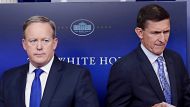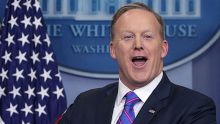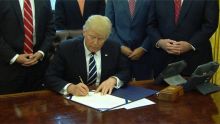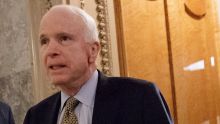Washington: First, they brought us fake news; and then, alternative facts. Now, compliments of the Trump administration, we bring you "instinctive correctness".
In defending what seems like a White House attempt to cover up what historians will no doubt call the Flynn Affair, spokesman Sean Spicer declared the President was "instinctively correct" in concluding there had been "no violation" when his now-departed national security adviser opened himself to blackmail by lying about seemingly breaking laws that forbid private citizens from negotiating in the name of the US government.
More World News Videos
Trump knew of Flynn's calls with Russia
US President Donald Trump knew for weeks that national security adviser Michael Flynn had misled the White House about his contacts with Russia but did not immediately force him out, White House spokesman Sean Spicer said.
No doubt, too, that Trump was "instinctively correct" in declaring that the real story here is the tidal wave of administration leaks that flushed former US Army general Michael Flynn from his White House security perch. In ignoring the enmeshing political, legal, security and diplomatic dimensions of the first, tempestuous month of his presidency, Trump seems to be of the view that he can shut this thing down.
But we interrupt this story to bring you another leak. The FBI and other US security agencies have uncovered evidence in phone records and intercepted calls showing that members of Trump's campaign team were making repeated calls to Russian intelligence officials in the year preceding the November 2016 election.
Uncovered amid an investigation into Russian hacking of the Democratic Party's computers, the phone evidence is being used to establish if Trump's campaign was colluding with the Russians, with a view to using the hacking or other efforts to influence the election. Apparently it wasn't, according unnamed law enforcement and security officials who spoke to The New York Times.
So many questions still need answers. And too many investigations and inquiries are already afoot - with calls for more, even by Trump's Republican allies in Congress - for the mess that is the triangle of Trump, Flynn and Moscow to go away any time soon.
Demands by prominent GOP senators that Flynn be hauled to the Capitol, to be grilled before a Senate investigation, signal that the whole Russia-Trump-Flynn story will get much bigger, before it gets so small that Trump might then have time to go after the leakers (bless their souls).
So let's do this by the numbers - six questions:
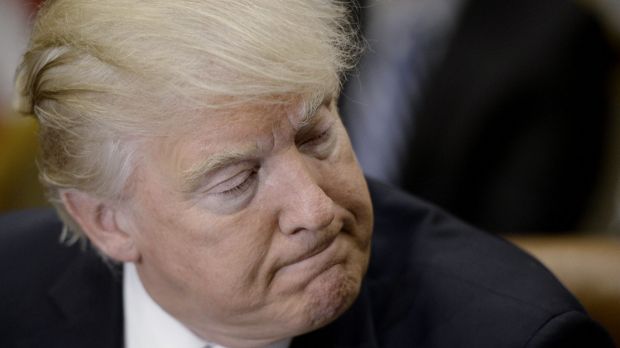
1. Were it not for the leaks, did Trump intend to keep Flynn by his side and pretend that his indiscretion and his lies were of no account, and that his administration might soldier on with a national security adviser who has been deemed a likely target for foreign blackmailers in the country's most secret councils?
2. If, as the White House acknowledges, Trump was advised of the circumstances and blackmail risk as far back as January 26, why did he feign ignorance when quizzed on February 10, about The Washington Post's latest explosive report?

3. Flynn's reputation as a loose cannon notwithstanding, who else in the Trump transition team might have workshopped the NSC chief's offending December phone call to the Russian ambassador? As Republican senator Lindsey Graham told CNN: "I find it hard to believe general Flynn would just go rogue, seems more likely someone directed him to engage the Russians."
4. Spicer said that Flynn had to go because of "the evolving and eroding level of trust as a result of this situation" - which would be Flynn's call to the Russians. But he continued, "and a series of other questionable incidents". What are these other career-destroying incidents?

5. Did Flynn lie only to his administration colleagues or, as reported, to the FBI as well? Will he be charged?
6. How does Trump, the I-love-Putin candidate, navigate demands from the likes of Republican Senator John McCain that Congress codify the existing suite of US sanctions on Moscow, as a block on Trump unilaterally agreeing to Russian requests to be freed from them?

There's already a blizzard of overlapping investigations into the Trump campaign's ties to Russia, with three Trump associates under investigation by the FBI and other agencies for their contacts with Moscow.
They are former campaign chief Paul Manafort and advisers Carter Page and Roger Stone. Now Flynn seemingly joins their ranks, prompting this tweet by former Obama adviser Ben Rhodes: "When campaign chairman and NSA [director] both resign over Russia ties there is more - Manafort and Flynn had nothing in common except Russia and Trump."

The Russian hacking ventures that US intelligence has concluded were intended to embarrass Democratic candidate Hillary Clinton and to help Trump's campaign are still being investigated by the security agencies and congressional committees.
Also being investigated is the so-called "dodgy" dossier, the work of a former senior British spy. The 35-page document makes two key points: It alleges that the Trump campaign was in collusion with Moscow, and the agencies have confirmed the veracity of some of this; but they have confirmed none of its more salacious element – that Moscow holds a so-called sex tape, made during a 2013 visit by Trump to the Russian capital, with which it intends to blackmail the American President.

The US Army is separately investigating if Flynn, as an ex-military officer, broke the law by accepting payment from a foreign government - his fees for appearing at a Moscow event organised by Russia Today, the Kremlin-funded cable news channel.
Calling for a full-scale investigation, House Minority Leader Nancy Pelosi told reporters: "The truth and consequences of the Russia connection: the American people deserve to know the full extent of Russia's financial, personal and political grip on President Trump and what that means for our national security.

"Flynn's resignation is a reflection of the poor judgment of President Trump and demands answers to the grave questions over the President's involvement. By what authority did Flynn act and to whom did he report?"
That's very much a "Well, she would say that, wouldn't she?" take on developments. More troubling for Trump will be the calls for investigations by some of his GOP colleagues in Congress.

Demanding an exhaustive investigation of Trump's ties to Russia, Missouri Senator Roy Blunt, a Republican, told a radio interviewer: "I think everybody needs that investigation to happen and the Senate intelligence committee, again, that I serve on, has been given the principal responsibility to look into this. And I think that we should look into it exhaustively so that at the end of this process, nobody wonders whether there was a stone left unturned.
"What did he know? What did he do? And is there any reason to believe that anybody knew that and didn't take the kind of action they should have taken?"
Flynn's demise is cast as a direct hit by the US intelligence services in their war with the Trump administration. Maligned and mocked as incompetent by Trump and Flynn, many in the agencies will celebrate that they were acting competently when they eavesdropped on the phone call that was Flynn's undoing.
But over at Breitbart News the spin is different - and it's not necessarily fake news.
Claiming to be well briefed by sources at the White House, where former Breitbart boss Stephen Bannon is Trump's chief strategist, the news site casts the Flynn flame-out as a war between GOP establishment forces and the high-octane near anarchists led by Bannon.
By their logic, if the "outsider" Flynn was made to fall on his sword, then so too must Trump's chief of staff and former Republican National Committee chairman Reince Priebus, a Washington "insider".


